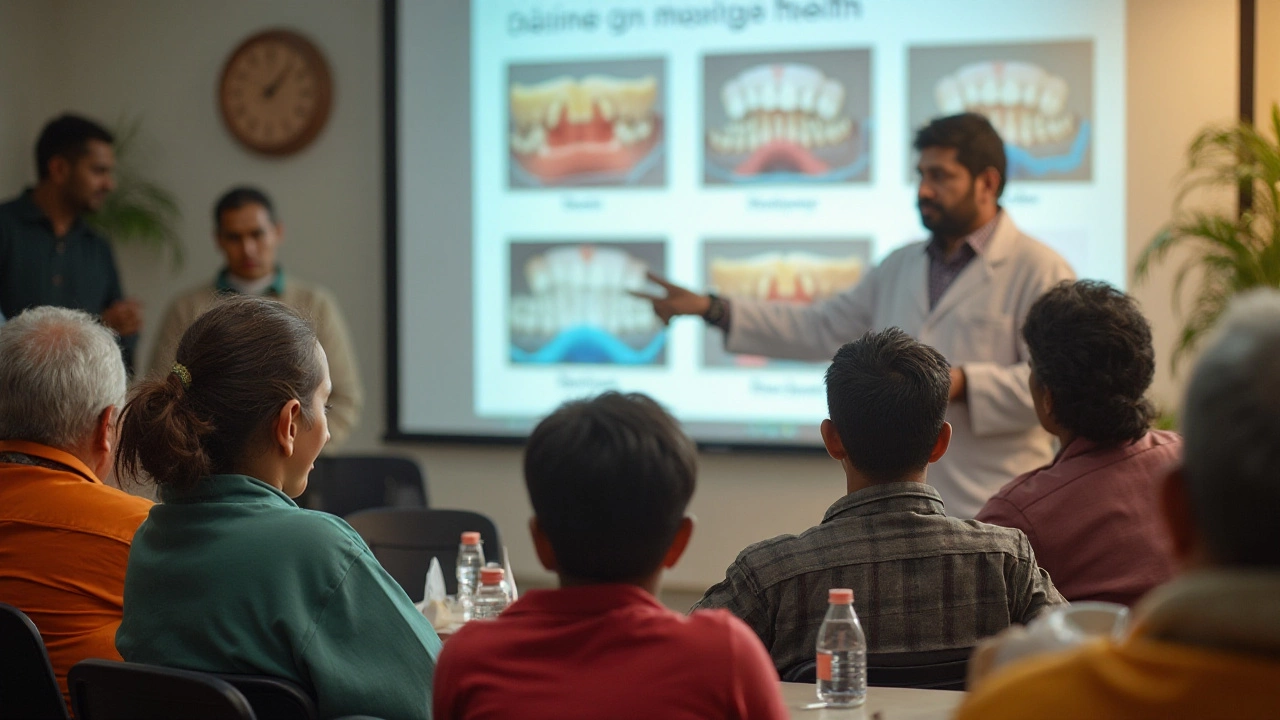
For many, dental implants provide a path back to a confident smile and effective chewing. Yet, this popular dental solution isn't universally fit for every individual seeking them. There are several critical factors that can make dental implants a less-than-ideal choice for some people.
In the world of dentistry, just as each smile is unique, so too are the medical and personal circumstances of those seeking enhancements. Certain health conditions, smoking habits, and even the density of your jawbone play pivotal roles in determining whether dental implants can safely and effectively meet your needs.
This article will dive deeper into these considerations, helping you discern who should pause before opting for implants. Alongside these insights, we will explore potential alternatives, giving you a broad view of available dental care choices. Our aim is to empower you with crucial knowledge so you can choose the best path for your oral health journey.
- Understanding Dental Implants
- Health Conditions and Considerations
- Lifestyle Factors and Habits
- Anatomical Challenges and Bone Density
- Alternative Dental Solutions
Understanding Dental Implants
Dental implants have revolutionized the world of oral health, providing a durable and aesthetically pleasing remedy for missing teeth. Imagine a small titanium post that is surgically inserted into the jawbone, which then serves as a robust foundation for artificial teeth. This is essentially what a dental implant is — a three-part solution consisting of the implant, an abutment, and the prosthetic tooth. Unlike dentures, which can slip or cause discomfort, implants behave like natural teeth, providing comfort and stability.
One might wonder why titanium is often the material of choice. Well, titanium is biocompatible, meaning it fuses seamlessly with the bone — a process known as osseointegration. This remarkable amalgamation results in unmatched support for crowns, bridges, or dentures. Most patients with dental implants experience a significant improvement in their ability to chew food, articulate speech clearly, and smile with confidence. It's these benefits that make implants such a popular choice. But popularity aside, it's vital to understand each component and the long-term commitments they entail. The initial procedure is methodical, requiring precise measurement and planning by dental professionals to ensure lasting success.
According to Dr. John Coates, a leading oral surgeon, "The success rate of dental implants is over 95% when performed by experienced professionals. Yet, patient selection remains key to maintaining this success rate."
The demand for dental implants continues to rise, with statistics indicating that nearly 3 million Americans currently have implants, and the number grows by half a million annually. But it's not merely about getting those pearly whites; the process demands involvement and care from both the dental team and the patient to ensure desired outcomes. It's worth noting that maintaining implants requires diligent oral hygiene — brushing, flossing, and regular dental visits to monitor the health of both the implant and surrounding tissues. This high level of care can deter individuals who are unable to commit to such routines. Thus, understanding the commitment required before opting for implants is crucial for both dental professionals and patients alike.
Health Conditions and Considerations
When it comes to deciding whether dental implants are the right choice, understanding the impact of various health conditions is vital. Implants require surgery, and like any other surgical procedure, certain medical conditions can complicate the process or affect recovery. One of the most notable considerations is bone density. Sufficient jawbone is essential for supporting the dental implants effectively. Osteoporosis or any condition that results in decreased bone density can pose significant challenges, as these bones are less likely to assimilate with the implants, increasing the risk of implant failure.
Diabetes, especially if uncontrolled, also presents a significant health consideration. High blood sugar levels can impede healing, which is a crucial part of the dental implant procedure. Diabetics are more prone to infections, and this increased risk can hinder the implant's integration into the jawbone. The healing of oral tissues is critical for implant success, and any delays or complications can lead to failures.
For patients undergoing treatments such as chemotherapy or taking medications like bisphosphonates, the advice is generally to delay implant placement. Such treatments may compromise the immune system or affect bone metabolism, making it difficult for the oral health structures to support the implant. An oncologist or physician should be consulted to weigh the pros and cons carefully.
According to Dr. John K. Kim, a prominent oral surgeon, "The suitability for dental implants isn't solely about dental health—it encompasses the holistic evaluation of a patient's overall health status."
Autoimmune diseases and conditions such as rheumatoid arthritis or lupus can interfere with healing due to chronic inflammation or medication side effects. These conditions can affect the oral mucosa's ability to recover post-surgery and integrate with the implant. Similarly, people with uncontrolled conditions like severe cardiovascular issues might face heightened surgical risks due to anticoagulant medications or the stress of anesthesia.
Smoking is another critical lifestyle choice that impacts implant success. Smokers face a 20% higher failure rate for dental implants compared to non-smokers. Smoking affects blood circulation and increases infection risk, impeding healing significantly. Quitting smoking before implant surgery and during the healing process is often advised to improve the chances of success.
In summary, candidacy for dental implants involves a comprehensive health overview. Dental professionals evaluate aspects that range from bone quality to systemic health conditions to ensure the risks are minimized. Where there are contraindications, alternative treatments may provide a safer, more effective solution. It is crucial for patients to have open discussions with their healthcare providers to make well-informed decisions about their dental care pathways.

Lifestyle Factors and Habits
When considering dental implants, it's not just the medical history we need to think about, but also how our everyday habits and preferences might impact the success of these procedures. Lifestyle choices can dramatically affect both the initial healing process and the long-term success rate of an implant. Smokers, for instance, are often advised to quit before considering implants. Smoking restricts blood flow to the gums, slowing down the healing process and increasing the chances of implant failure. This is a significant concern since dental implants rely heavily on proper healing and integration with the jawbone.
Then there are dietary habits to ponder. A diet high in sugar not only poses threats to your natural teeth but can also impact the health of your gums where implants are concerned. Maintaining a balanced diet rich in nutrients supports gum and bone health, essential for those undergoing implant surgery. It's not just about avoiding the wrong foods; it's equally important to embrace the right ones to promote healing and overall oral health.
Another critical lifestyle factor is alcohol consumption. Excessive drinking, like smoking, can impede healing and may lead to inflammation of the gums. It also complicates post-surgical care, as alcohol can interfere with pain medications and antibiotics prescribed after the implant procedure. Therefore, individuals who consume alcohol frequently may need to modify their habits for successful implant results.
Physical activity levels might seem like an unlikely contributor, but they also play a role. Those who engage in high-impact sports must consider the risks these activities pose to new dental implants. Mouthguards and other protections are crucial during the healing phase to prevent any accidental trauma that could dislodge or damage implants. Hence, adapting protective measures is a practical step for active individuals considering this dental option.
Let's also discuss stress and its implications. Stress affects every aspect of our health, and dental health is no exception. It can lead to behaviors such as teeth grinding (bruxism), which puts excessive force on implants, potentially leading to failure. Managing stress through relaxation techniques or professional support can thus enhance the outcome of dental implant procedures.
"Understanding these lifestyle factors is vital," says Dr. Sarah Timmons, a noted expert in implant dentistry, "because even the best medical technology can only succeed within the context of a healthy and supportive lifestyle environment."
Making a conscious effort to address these lifestyle factors can go a long way in ensuring that your decision to opt for dental implants results in the radiant, healthy smile you're aiming for. It's about embracing changes not just for the sake of dental implants but for your overall health and well-being.
Anatomical Challenges and Bone Density
The success of dental implants largely hinges on the ability of the jawbone to integrate with and support the implant. A critical factor in this process is the density and volume of the bone itself. Unfortunately, not everyone has adequate bone density. When an individual lacks sufficient bone structure, it becomes difficult for the implant to properly anchor into place, leading to a risk of failure. This is why dentists often perform thorough evaluations before moving forward with the procedure. This assessment typically involves X-rays or advanced imaging techniques to measure bone levels.
Bone density issues are most common in people who have lived with missing teeth for an extended period. This absence leads to bone resorption, a process where the body naturally breaks down and absorbs the bone because it is no longer needed to support a tooth. Therefore, early intervention is crucial for those considering implants after tooth loss. Additionally, conditions such as osteoporosis, where density and quality of the bone are reduced, can also impede the success of implants.
In many cases, when a patient is found to lack sufficient bone density, bone grafting is recommended. This procedure involves using either a bone substitute or bone from another part of the patient’s body to build up the jawbone to a sufficient state. Once healed, this allows the implant to be placed with a higher degree of success. However, bone grafting requires additional time and has its own risks that need to be considered.
According to Dr. Susan Tanner, a renowned oral surgeon, "Patients with significant bone loss must be evaluated carefully. A comprehensive plan that may include augmentation procedures ensures that dental implants have the best possible chance for long-term success."
But anatomical challenges extend beyond just bone density. A patient's sinus cavity, nerves, and blood vessels can also complicate implant placement. This is especially true for those receiving implants in the upper jaw, where the sinus cavity is located. Special techniques such as a sinus lift might be necessary to create enough room for implant placement without interfering with the normal functioning of the sinuses.
For individuals unable or unwilling to undergo additional surgeries like bone grafting or sinus lifts, alternative solutions exist. One option is mini implants, which are smaller versions that require less bone to hold them in place. Another approach could be removable dentures retained by implants in more stable bone regions, offering a compromise between full implants and traditional dentures. Each case is unique, so discussing these alternatives with a dental professional is crucial to determine the best route.
Being well-informed about your own oral health circumstances and the realistic possibilities set by modern dentistry can guide you in making a decision that aligns with your health and lifestyle priorities. Remember, good dental health is about more than aesthetics; it’s about comfort, functionality, and self-confidence.

Alternative Dental Solutions
Exploring alternatives to dental implants can be crucial for those who have been advised against them due to medical, lifestyle, or anatomical reasons. Thankfully, the field of dentistry offers various strategies for patients to restore their smiles without the need for implants. One of the most traditional yet evolving methods is the use of dentures. These have come a long way from their initial designs, with modern versions offering improved comfort and natural aesthetics. Dentures can be full or partial, depending on the extent of tooth loss, and provide a non-invasive way to regain full functionality of your mouth. With advanced materials and fabrication techniques, today's dentures are more durable and comfortable than ever before.
Bridgework is another reliable alternative. Dental bridges fill gaps by anchoring onto existing teeth or crowns, creating a seamless look. This solution is advantageous for those who may have sufficient strong teeth adjacent to the gap. A skilled dentist ensures that the bridge blends flawlessly with natural teeth, offering both an aesthetic and functional remedy. Unlike implants, bridges do not require surgery and are thus an attractive option for patients wary of invasive procedures.
"Dental bridges can serve as a convenient and less invasive alternative to implants, especially when adjacent teeth can offer the necessary support," says Dr. Elizabeth Richards, a leading authority in restorative dentistry.
For those seeking cutting-edge techniques, resin-bonded bridges, sometimes known as Maryland bridges, use a metal framework with a porcelain tooth attached. This alternative is particularly suitable where there is less pressure on the teeth, such as the front teeth. These bridges are often used when there is minimal tooth reduction required, preserving more of the natural tooth structure. This method utilizes a more conservative approach, making it an excellent choice for suitable candidates who are conscious about retaining their natural teeth as much as possible.
People who have been advised against implants due to insufficient bone density can consider bone augmentation techniques when planning for future implant readiness. Bone grafting allows for the rebuilding of jawbone mass, possibly qualifying someone for implants later on. Until then, these patients can benefit from the non-implant solutions like dentures or bridges. In recent years, technologies such as digital impressions and CAD/CAM design have also revolutionized the fit and comfort of these alternatives, offering tailored solutions that were once unimaginable. Consideration of these advanced alternatives opens up possibilities previously limited to conventional methods.
The decision to opt for alternatives to dental implants ultimately depends on individual circumstances. It's crucial to consult with a dental care professional to explore the most suitable options tailored to their needs. With so many choices available today, everyone can find an approach that best suits their health requirements and lifestyle, ensuring both functionality and aesthetics in their dental care. Solutions continue to evolve, and staying informed about cutting-edge technologies and procedural advancements enables individuals to make the best-informed decisions regarding their oral health.
Caring for Your Dental Alternatives
Once you've chosen the appropriate dental solution, maintaining it with proper care and hygiene will ensure its longevity. Regular dental check-ups and following your dentist's guidance on care routines are essential. Whether it's dentures or bridges, ensuring they are cleaned and maintained correctly will not only increase their lifespan but also enhance your overall oral health. It's the small, daily efforts that make a big difference in the lasting success of dental solutions.





Rohan Talvani
I am a manufacturing expert with over 15 years of experience in streamlining production processes and enhancing operational efficiency. My work often takes me into the technical nitty-gritty of production, but I have a keen interest in writing about medicine in India—an intersection of tradition and modern practices that captivates me. I strive to incorporate innovative approaches in everything I do, whether in my professional role or as an author. My passion for writing about health topics stems from a strong belief in knowledge sharing and its potential to bring about positive changes.
view all postsWrite a comment